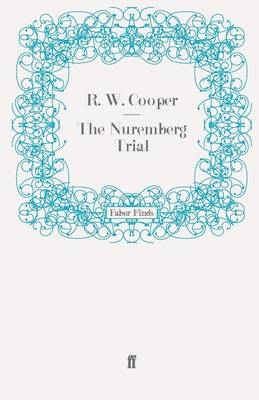
The Nuremberg Trial
Faber & Faber (Verlag)
978-0-571-27273-0 (ISBN)
'They were hanged at dead of night on October 16 - hanged, that is with the exception of Goring. He, mocking to the end, took cyanide of potassium in his cell as the hour approached and was dead by the time the doctors were called. The finding of the board of inquiry that he had it all the time fit in well enough with the little ironical smile that we saw in the dock. For a day he made sport of Nuremberg, above all of American security and its year of pin-pricks. But Goring is dead and the others with him.
It could hardly have been more sordid - the grimy prison gymnasium in which soldiers played their ball games, with its row of blazing lights, its three scaffolds, the ugly scrawled inscription on one of the wall ''V. D. walks the streets.'' Hollywood to the end. And one after another the monstrous leaders of the Third Reich fell with the name of the Fatherland on their lips. Have we after all created a grotesque legend?'
This is how Robert Cooper's book ends. The book itself has the distinction of being the very first to have been published about the Nuremberg Trial. Its business was finished in October 1946: this book was published in January 1947. Penguin was its publisher, and it is worth quoting from the original blurb, 'This popular but full account of the epoch-making trial of the War criminals at Nuremberg, specially written for Penguin Books by The Times special correspondent who covered the process, is intended as a permanent summary and record of the first attempt to bring to justice the authors and begetters of international crime against humanity.'
The author admits to there being 'many gaps and other deficiencies in this necessarily hurried summary of the Nuremberg Trial' and pleads with History to bring about a perspective, but it is the very immediacy of the account that makes it so compelling and still worth reading.
R. W. Cooper joined The Times in 1924 and remained with the paper for forty-five years before his retirement in 1969. As a war correspondent he reported from France leaving Paris as the Germans marched in. For several years he reported 'the forgotten war' in Burma and India before returning to Europe. As foreign correspondent after the war, he was first in Germany then the United States to cover the formation of the United Nations, and later became chief correspondent in Washington. His last posting was in Paris. As The Daily Telegraph wrote in its obituary on Cooper's death in April 1992, 'Bob Cooper, who has died aged eighty-seven, covered the world with great distinction but scant recognition (because) The Times was the last of the British nationals to give its writers bylines. There is no doubt that Cooper's reporting would have won him fame if he had worked for a more modern newspaper.' The Nuremberg Trial, reissued in Faber Finds, was the first book on the subject. Robert Cooper was the only British journalist to cover the trial for its duration, producing daily articles ranging from 350 to 6000 words, and it was these articles that formed the basis of the book.
| Erscheint lt. Verlag | 19.8.2010 |
|---|---|
| Verlagsort | London |
| Sprache | englisch |
| Maße | 135 x 216 mm |
| Gewicht | 338 g |
| Themenwelt | Geschichte ► Teilgebiete der Geschichte ► Militärgeschichte |
| Recht / Steuern ► EU / Internationales Recht | |
| Recht / Steuern ► Rechtsgeschichte | |
| Sozialwissenschaften ► Politik / Verwaltung | |
| ISBN-10 | 0-571-27273-8 / 0571272738 |
| ISBN-13 | 978-0-571-27273-0 / 9780571272730 |
| Zustand | Neuware |
| Haben Sie eine Frage zum Produkt? |
aus dem Bereich


